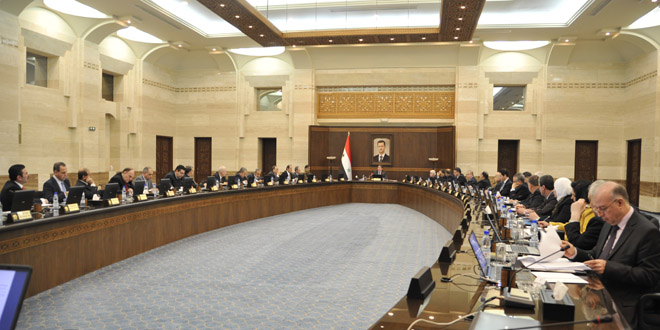Damascus – The Cabinet discussed during its weekly session on Tuesday a number of services and economic issues, including means to control prices in market, prevent monopolization of goods, provide the needs of the agriculture sector, and creating production sectors to create new job opportunities.
Chairing the session, Prime Minister Wael al-Halaqi said the government will not abandon social subsidizing policy, and that the change in the prices of some goods and services seeks to provide income to improve services and develop the economy, and not providing profit for the state treasury, SANA reported.
The Premier said that the funds for subsidizing electricity sector in 2016 alone are estimated at SYP 326 billion, while funds for subsidizing bread are set at 170 billion, noting that the price of a state-produced bread bundle is SYP 50, while its actual cost for the state is 210.
He also said that the government allocated SYP 2.5 billion for the Agricultural Production Support Fund and another 2.5 billion for the Disasters and Drought Compensation Fund.
Al-Halaqi stated that the government will continue fighting corruption and corrupt individuals regardless of their positions, saying that no-one has immunity in this regard, adding that in this context, one director general, two fuel department directors, one supplying department director, and scores of accountants and sub-directors were relieved of their posts since the start of December 2015.
He also addressed the unprecedented price hikes for various products, particularly those linked to the USD, instructing the Internal Trade and Consumer Protection Ministry to take steps to address this issue.
For his part, Deputy Prime Minister, Foreign and Expatriates Minister Walid al-Moallem said that “the Syrian Arab Republic delegation for the Geneva dialogue is ready to participate, and the responsibility for any delay in holding that meeting would lie on the other sides.”
Al-Moallem also reviewed the results of his recent visit to India, saying it should help develop economic, commercial, industrial, and political relations between the two countries.
The Cabinet also approved a bill on establishing a higher institute for languages at Tartous University.

